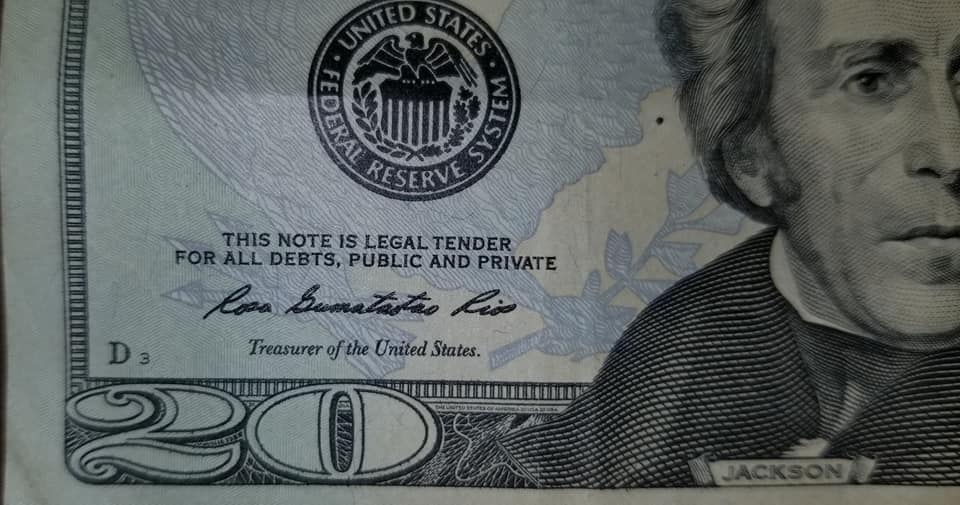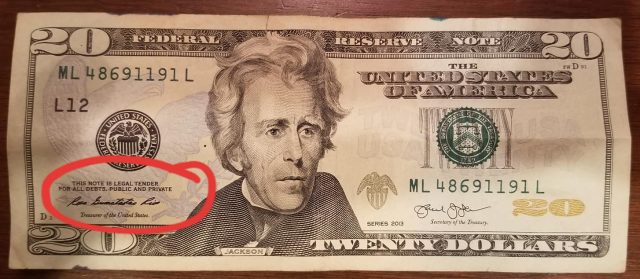OHIO – A Mississipi Senator is breaking down the rules to companies that say that they will not take cash for transitions, and thats not ok, but he may not be complete correct.
Mississippi Senator says that all you have to do is look at a legal bill and you can see printed words that say, “this note, is Legal Tender for all debts, public and private.”
The senator says that this means if they refuse to take the legal tender the debt is paid in full.
“Business owners, if you refused to take cash, the debt is paid in full. If you are a business owner and you refuse to take cash, you are breaking the law.”
This law is for the state of Mississippi, but somewhat holds true for Ohio as well.
The Senator gives an example of how money is exchanged for goods, “here is an example, if I stop by your store and I purchase $44 worth of fuel, and I try to pay you with a $100 bill and you refuse payment of cash, the debt is paid in full. There is nothing you can do to prosecute me because you have refused payment of Legal Tender, unless the business suspects counterfeit bills.”

When can businesses refuse cash? If there is no debt then companies under federal law can require other forms of payments, say for example a piece of clothing you plan on buying at a store. Since you haven’t purchased it yet it hasn’t become a debt, they can refuse that payment of cash. The example the senator gives above means that a person has already assumed debt and owes someone for that debt, at that point in time the creditor must take the cash as form of payment or forgo the payment.
Federal laws do not cover that cash is the sole proprietor of payment, just one that can be used across the US for exchange of monies. There is, however, no federal statute mandating that a private business, a person or an organization must accept currency or coins as payment for goods or services. Private businesses are free to develop their own policies on whether to accept cash unless there is a state law which says otherwise.
The senator then touches on the change storage, “that some companies are requesting correct change,” because of the coin shortage that is understandable and you should be able to work out any change issue because we are talking about .99 cents worth of change max.”
The federal reserve commented last week on the change shortage, according to the federal reserve the pandemic has “significantly disrupted the supply chain and normal circulation patterns for U.S. coin.”
Last week during a virtual hearing with the House Financial Services Committee we received some answers.
Most of the coin shortage has been caused by the mass closings of U.S. business and changes in the way these businesses operate. Preferring to accept online transactions and other cashless systems. To add to that, “the mints were not creating as much coins because they were trying to keep employees safe. So circulation has gone down. Coins couldn’t be counted from customers and businesses, due to COVID-19 and this is a way we get coins back into circulation also.”

Some banks and stores are dealing with it by recycling coin that they are taking in instead of taking it to the bank and having rolled coin.
According to the hearing the shortage will be short-lived, the mint is back into operation and with more people spending cash as more of the country reopens more coins will be in production. One suggestion that was given was if you have a bucket of change at home take it into banks to cash it in to help circulation issues.
Some banks and stores are dealing with it by recycling coin that they are taking in instead of taking it to the bank and having rolled coin.
According to the hearing the shortage will be short-lived, the mint is back into operation and with more people spending cash as more of the country reopens more coins will be in production. One suggestion that was given was if you have a bucket of change at home take it into banks to cash it in to help circulation issues.









